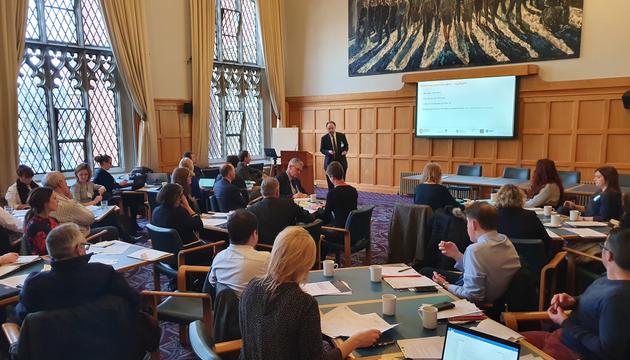
Belfast Climate Commission explores how finance can support a just transition in Northern Ireland
7th February 2020 - 14:10
The Belfast Climate Commission has held a first meeting to identify the role of the finance sector in ensuring a just transition in Northern Ireland. Hosted at Queen’s University Belfast (QUB) on Friday 24 January, the workshop was organised as part of the UK-wide Place-based Climate Action Network (PCAN) and was delivered together with the London School of Economics and UK Finance, the main financial sector association.
Over 40 senior stakeholders from across banking, investment, devolved and local government, academia and civil society met to discuss how a just transition – a transition to net zero emissions that is fair and inclusive – can be achieved in Northern Ireland and what the role of the finance sector should be.
“Financing the just transition in NI is the key challenge for the next decade,” said Clare McKeown, Sustainable Development Manager at Belfast City Council. “The seminar brought together the leading lights in the finance sector with climate strategists, for the first time, to explore the best routes to accelerate this necessary change.”
Professor John Barry of QUB, said: “It is clear that while support for the just energy transition is unevenly spread across the financial system, especially here in Northern Ireland, there have been and continue to be significant positive developments on climate action within both the sector and regulators.”
The group identified key challenges, including financing clean energy, the retrofitting of housing, and supporting SMEs to align their technology and business models with climate goals. Across the UK, banks and investors are starting to play an active role in the transition through their engagement with customer and companies, through reallocating capital, and through partnerships with key stakeholders.
Nick Robins, Professor in Practice for Sustainable Finance at the LSE said: “Banks and investors as well as financial regulators, such as the Bank of England are scaling up their climate efforts. There’s real demand for place-based solutions that respond to the needs of specific communities – and the Belfast workshop revealed the enthusiasm among local stakeholders for bold action.”
The group focused on a range of priority issues for financing, including tackling fuel poverty, supporting SMEs, and enabling the agriculture sector to make the shift. It also emphasised how climate action in Northern Ireland must be a joint endeavour linking Britain and Ireland. Ideas included the possibility of financing a retrofitting programme the social housing of the Northern Ireland Housing Executive, for example through a green bond.
The meeting highlighted the role that local anchor institutions such as building societies, credit unions and pension funds could play. For example, the Northern Ireland Local Government Officers Superannuation Committee (NILGOSC), manages £8bn of assets and has adopted a climate change policy.[1] Household savings in the region are estimated at £11bn[2] and mobilising them to finance the just transition would have multiple benefits.
David Gavaghan, Managing Director of Aurora Prime Real Estate and chair of the Climate Finance working group at the Belfast Climate Commission, said: “Queen’s University hosted an excellent initial workshop to start to determine the practical steps that we will need to take. We aim to have further regular sessions in the coming months.”
The workshop was organised as part of the Banking on a Just Transition project, led by the LSE’s Grantham Research Institute, which is holding dialogues across the UK to identify practical ways of financing climate action with positive social impact. The project is being delivered in partnership with UK Finance. [3]
Paul Leonard, non-executive chair of the UK Finance Northern Ireland Committee, said: “Sustainability is a key priority for UK Finance here in Northern Ireland. Our members want to be part of the solution and support their customers so we deliver a just transition.”
The Belfast Climate Commission is co-chaired by QUB and Belfast City Council and is funded by the Economic and Social Research Council as part of the Place-Based Climate Action Network (PCAN). The Commission was launched on 10 January 2020 and is one of three place-based climate commissions along with Leeds (established 2017) and Edinburgh (launching February 2020).
The PCAN Network also has platforms on business and finance. The Finance Platform, based at the LSE, aims to connect the demand for climate finance with supply from banks and investors, and the Belfast workshop was one of a series to identify ways for Belfast and other cities to accelerate their climate efforts.
Read about the Banking on a Just Transition place-based dialogues and our Finance Platform here.
More information about Belfast Climate Commission can be found @BelfastClimate or by emailing John Barry at j.barry@qub.ac.uk
[1] https://www.nilgosc.org.uk/
[2] Northern Ireland Council for Voluntary Action: https://www.nicva.org/resource/economic-inequality-in-northern-ireland
[3] http://www.lse.ac.uk/GranthamInstitute/publication/banking-the-just-transition-in-the-uk/



